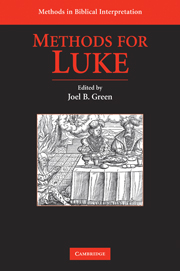4 - Narrative Criticism
Published online by Cambridge University Press: 05 June 2012
Summary
We refer to the wider discipline of studying the nature, form, and functioning of narrative texts as narratology, but in biblical studies a constellation of interests and a variety of practices in the study of narrative have consolidated under the heading of narrative criticism. As a mode of study, narrative criticism would seem to require little by way of justification, because the first five books of the New Testament (NT), the Gospels and Acts, are each cast in narrative form, but lingering questions about the literary unity of these documents and the significant differences between ancient and contemporary narratives press for care in the construction of a narrative–critical method.
FROM THERE TO HERE: THE RISE OF NARRATIVE CRITICISM
With precedents far back in the history of interpretation, any time readers took seriously how the Bible tells stories and promoted the practice of close reading, narrative criticism in the modern era surfaced prominently in the 1980s. At the outset, narrative study was limited by its overly narrow focus on the texts themselves, as if texts could and ought to be regarded as self-sufficient, self-contained verbal artifacts. Accordingly, the text was presumed to be the unique and privileged source of meaning, with “meaning” available to the interpreter only by means of careful attention to its language and structure, without regard for concerns of a social–historical kind and with no sensible way to account for how or why different readers might understand the same narrative differently.
- Type
- Chapter
- Information
- Methods for Luke , pp. 74 - 112Publisher: Cambridge University PressPrint publication year: 2010
References
- 2
- Cited by

